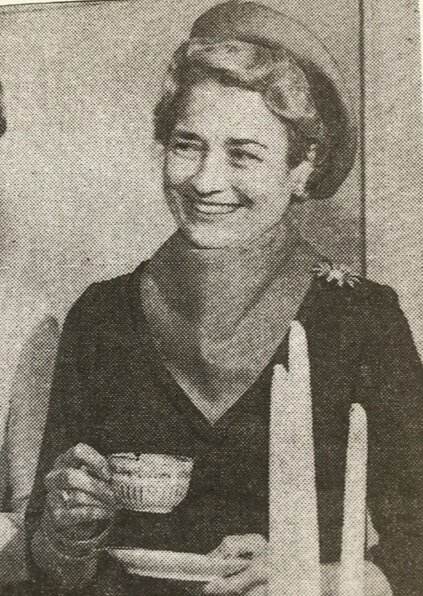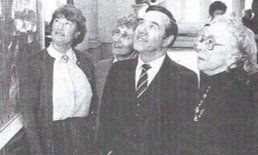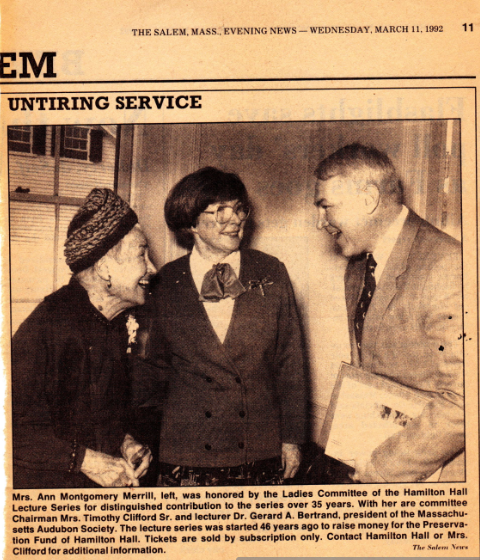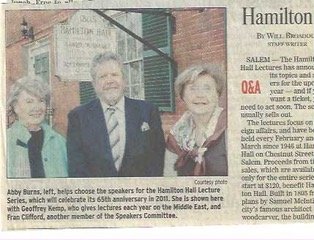History of the Hamilton Hall Lecture Series on World Affairs
About Hamilton Hall
Hamilton Hall, designed by the great architect and woodcarver, Samuel McIntire, was built in 1804-05 and is a designated Registered National Historic Landmark. The Hall was built to be an Assembly Hall used for meetings, dances, receptions, banquets, musical performances, lectures, and other social events. The Hall has an unbroken history of hosting such events. Through the years the Hall has seen many famous people pass through its doors to enjoy a dance, a banquet or a lecture. Perhaps the best known was Marquis de Lafayette, who was entertained there. The reception room on the second floor is named for him.
The Origins of the Lecture Series
In 1946, after World War II, a group of Salem women who knew of the need for improvements, restoration, and general maintenance of the Hall formed a Current Events Committee to organize a weekly lecture series on World Affairs. The Lectures were planned to take place on the eight Thursdays in February and March at 11:00 A.M. The series continues to be offered today, same time and place, with the modern addition of remote replays.
A Grand Tradition
Originally, the one and only speaker for all eight lectures was James H. Powers, the Foreign Editor and Chief Editorial Writer for the Boston Globe. Now most speakers are professors and leading scholars in their field and are from universities in the Boston area.
Serving bouillon in the Lafayette Room before the lecture has been a longstanding tradition. Years ago sherry was included in the recipe. This seemed to cause drowsiness in some and soon the sherry was left out.
Tradition does play a large part in the series and little has changed since its inception. Each usher holds two cough drops should the need arise and each usher is trained in safety procedures. Also, smoking is no longer allowed in the Lafayette Room. Ladies have been requested noto bring their knitting nor their laptops as the noise is distracting.
Luncheon had been served in the Brick Hearth Room. Today speakers join members of the Ladies Committee at one of their houses for lunch and conversation. The biggest change is that more men began attending in the 1990s and now make up almost one half of the audience.
We are now able to offer lecture replays to ticket holders as well.
Ann Montgomery Merrill
Ann Montgomery Merrill was among the group that founded the series in 1946. James H. Powers gave all eight lectures for the first twelve years. After Powers was unable to give all eight lectures, Ann Merrill held, for the next fourteen years, the important position of enlisting eight speakers, one for each week in February and March. Since that time the Committee has expanded into a group of women who research and contact speakers for the series. Other series responsibilities include: invitations, mailing, floral arrangements, ushers, bouillon preparers and servers. Recently, important technical positions have been introduced as well.
Originally the Ladies Committee presented $350 to the Hall. Today that sum is many times that amount. The funds are used for restoration projects and upkeep of the Hall. Among the many improvements the series funds have made possible are some four hundred chairs needed for the lectures, a new sound system, window restoration, and a granite step and railing.
In the bleakness and cold of winter the Hamilton Hall Lecture Series offers the warmth of a social gathering and a talk by some of the most informed lecturers, professors and writers of our time. Entering into the Hall from the cold and the ice and being cheerfully greeted by Salem historian, Jim McAllister, is the highpoint of many of the patrons’ winters.
The Series and Its Early Speakers
James H. Powers
Powers was Foreign Editor and Chief Editorial Writer for The Boston Globe. From his obituary we learn that, “His trenchant and well- grounded articles on current political and economic subjects reflected a scope of information and a breadth that few journalists could match.”
Geoffrey Godsell
In 1958, Geoffrey Godsell became a long lasting and favorite speaker for the next sixteen years. “Godsell was not only a superb foreign reporter and commentator, he was also on everybody’s list of favorite human beings.” Godsell was Overseas Editor at The Christian Science Monitor.
Robert Rotberg
Robert Rotberg, an expert on Africa, was president of the World Peace Foundation, Professor at MIT, Tufts, Harvard and, later, President of Layfette College.
Lincoln Bloomfield
Lincoln Bloomfield was a Professor at M.I.T. and a leading foreign policy expert. He served on the National Security Council. Edwin Reischauer was a diplomat, educator, and Professor at Harvard. He was the leading scholar on the history and culture of Japan and East Asia. He was former ambassador to Japan.
Geoffrey Kemp
Geoffrey Kemp, an expert on the Middle East, gave his first lecture in 1971. Once traveling from Cambridge, he now comes from Washington, D.C. where he is Director of Regional Security Programs at the Center for the National Interest.
Selecting Speakers
Most of our speakers are professors and leading scholars in their field and most are from universities in the Boston area. [The Fletcher School at Tufts, The Kennedy School of Government at Harvard, M.I.T., Boston University, Boston College, etc.] Some are well-known journalists, authors, and former ambassadors.
Each year we try to cover several areas where there are issues of global importance. Our Speakers Committee works throughout the year evaluating audience survey comments and suggestions for future speakers and topics of interest. Some of our many recent speakers include:
Sung-Yoon Lee, Korea
Ann Velenchik, Economics
Nicholas Burns, World Affairs, Former Ambassador to NATO and
Greece, now Ambassador to The People’s Republic of China
Andrew Bacevich, Professor Emeritus, International Relations
Jorge Dominguez, Central and South America
Stephen Walt, International Affairs
Thomas Nichols, Author, Contributing Writer, The Atlantic
Stephen Kinzer, Author, Foreign Correspondent
Danielle Allen, Political Theorist, Ethics
Aaron Bernstein, Public Health, Climate, Global Environment
Robert Kuttner, China, Public Policy
Nicco Mele, Media Politics, Public Policy
Paula Dobriansky, Foreign Policy
James Carroll, Author, Journalist, Historian
Gerard Bertrand, Environment, Climate Change
Frank Wisner, Former Ambassador to Egypt and India
Hussain Haqqaini, Pakistani Journalist, Former Pakistani Ambassador
Cathryn Cluver Ashbrook, Foreign Relations
Rachael Kyte, Environment, Climate Change



